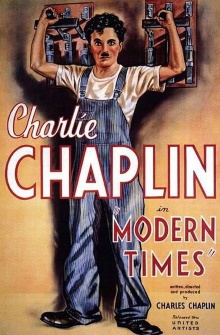Here’s another Charlie Chaplin film, picked for its fame and because my wife has fond memories of it. This also marks the final appearance of Chaplin’s The Tramp character and apparently serves as a kind of farewell. Knowing this fact actually helps make more sense of some of the choice made in this film. For my part, I am once again immensely impressed by Chaplin’s prowess and the factory scenes are truly memorable. I found the other skits are less interesting however and the film gets repetitive and drags on after a while.
The Tramp works on an assembly line in a factory where his job consists entirely of tightening bolts with a quick twist of a couple of wrenches. The mind-deadening and repetitive nature of the job combined with the intrusive, Big Brother-style supervision eventually causes the Tramp to have a nervous breakdown as he applies the wrenches to everything vaguely bolt-like in sight. After a stint in the hospital, he is released only to accidentally get caught up in a labor demonstration by Communists and is thrown in jail. Naturally he has plenty more misadventures there including getting high on drugs, accidentally escaping and helping to foil a jail break. For his help he is offered early release, yet he finds that he prefers the easy life in jail. Soon after he meets an orphaned and homeless girl Ellen who is wanted by the police for stealing food. After he tries to help her escape, they fall in together and try to make a new life for themselves.
As usual the film is really just a collection of skits with a common theme loosely connecting them and doesn’t have a real plot of any kind. All of the skits showcase Chaplin’s incredible performing ability and physical dexterity, including in one scene his mastery of roller-skating. Still it’s the early factory scenes that stand out to me as it is a cartoon-like depiction of assembly line work, except enacted in real life with oversized levers and mechanical gears and buttons everywhere. The boss literally oversees the work from his office through giant screens and in order to boost productivity, an inventor proposes doing away with the lunch hour and using a robot to feed the workers while they continue working. It incorporates ideas that are plainly political including the accusation that such alienating work drives the ordinary people insane and that the police are thugs who work for the establishment.
The film espouses clear sympathies for the Communist movement here, especially set as it is in the Depression era. Apparently Chaplin really thought that automating factories using machines was what led to job losses as well and he was influenced in this thinking by Mahatma Gandhi. The truth of his views aren’t worth debating but it is an interesting representation of the populist views of the time. At the same time, it is kind of hard to square sympathy for the plight of the poor with the plain fact that the film shows the Tramp being incompetent at every job he tries his hand at. Ellen laments about how impossible it is to work towards a decent life yet the Doylist reason for their endless troubles is that Chaplin knows the character of the Tramp would not be the Tramp if he could achieve any kind of stable and happy life, so he must be resigned to an endless life of wandering.
All this is to say that I really like the initial factory scenes but I’m kind of indifferent to the rest. I think the format of a feature-length film works against what Chaplin is best at here as a film goes on for too long and has to include elements that may not necessarily go well together. Chaplin’s skits and ideas would have been amazing in our Internet era with its emphasis on short video clips.
